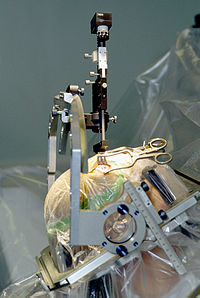
Photo from wikipedia
OBJECTIVECancer patients suffering from severe refractory pain may benefit from targeted ablative neurosurgical procedures aimed to disconnect pain pathways in the spinal cord or the brain. These patients often present… Click to show full abstract
OBJECTIVECancer patients suffering from severe refractory pain may benefit from targeted ablative neurosurgical procedures aimed to disconnect pain pathways in the spinal cord or the brain. These patients often present with a plethora of medical problems requiring careful consideration before surgical interventions. The authors present their experience at an interdisciplinary clinic aimed to facilitate appropriate patient selection for neurosurgical procedures, and the outcome of these interventions.METHODSThis study was a retrospective review of all patients who underwent neurosurgical interventions for cancer pain in the authors' hospital between March 2015 and April 2018. All patients had advanced metastatic cancer with limited life expectancy and suffered from intractable oncological pain.RESULTSSixty patients underwent surgery during the study period. Forty-three patients with localized pain underwent disconnection of the spinal pain pathways: 34 percutaneous-cervical and 5 open-thoracic cordotomies, 2 stereotactic mesencephalotomies, and 2 midline myelotomies. Thirty-nine of 42 patients (93%) who completed these procedures had excellent immediate postoperative pain relief. At 1 month the improvement was maintained in 30/36 patients (83%) available for follow-up. There was 1 case of hemiparesis.Twenty patients with diffuse pain underwent stereotactic cingulotomy. Nineteen of these patients reported substantial pain relief immediately after the operation. At 1 month good pain relief was maintained in 13/17 patients (76%) available for follow-up, and good pain relief was also found at 3 months in 7/11 patients (64%). There was no major morbidity or mortality.CONCLUSIONSWith careful patient selection and tailoring of the appropriate procedure to the patient's pain syndrome, the authors' experience indicates that neurosurgical procedures are safe and effective in alleviating suffering in patients with intractable cancer pain.
Journal Title: Journal of neurosurgery
Year Published: 2019
Link to full text (if available)
Share on Social Media: Sign Up to like & get
recommendations!